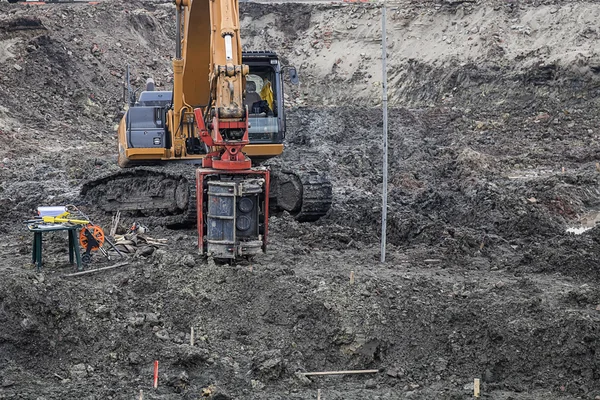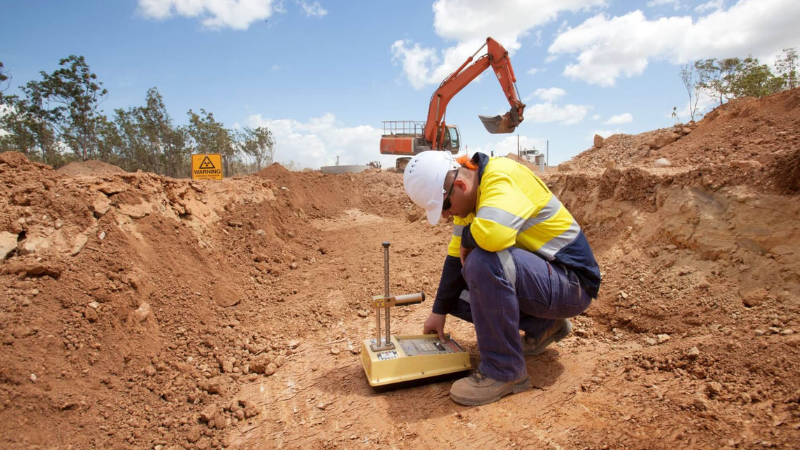Why the Geotechnical Industry Demands Cutting-edge Solutions Currently
Why the Geotechnical Industry Demands Cutting-edge Solutions Currently
Blog Article
A Detailed Summary of the Key Duties of Geotechnical Designers in Site Characterization and Ground Improvement Techniques for Design Solutions
Geotechnical engineers are important to the effective execution of engineering tasks, entrusted with the crucial responsibilities of website characterization and the application of ground improvement strategies. Their work entails a thorough analysis of subsurface problems, employing different testing techniques to determine dirt and rock buildings.
Duty of Geotechnical Engineers
Geotechnical designers play a critical duty in the style and building and construction of facilities by analyzing the habits of soil and rock under the surface area - geotech engineer. Their responsibilities incorporate reviewing subsurface conditions to educate design choices that guarantee architectural stability and safety and security. By carrying out detailed analyses of dirt buildings, consisting of shear permeability, compressibility, and strength, geotechnical designers provide vital information that influences the selection of proper building and construction materials and strategies
In enhancement to analyzing dirt mechanics, geotechnical engineers are charged with determining possible hazards such as landslides, sinkholes, and ground settlements. Their proficiency assists reduce dangers linked with these geotechnical phenomena, therefore securing both the atmosphere and public security. They likewise collaborate closely with other design techniques, ensuring that geotechnical factors to consider are incorporated into general task design.
Moreover, geotechnical engineers engage in the analysis of existing structures, providing recommendations for retrofitting and fixings when needed. Their detailed understanding of soil-structure interaction is crucial for the advancement of lasting infrastructure options. In general, the duty of geotechnical engineers is integral to the successful realization of building and construction jobs, ensuring they are secure, sturdy, and certified with regulatory criteria.

Website Characterization Procedures
Effective website characterization processes are essential for comprehending the subsurface problems that influence task design and execution. Geotechnical engineers utilize an organized method to collect, examine, and translate information regarding dirt, rock, and groundwater attributes. This process begins with a complete evaluation of existing literary works and historic site information, giving insights into previous site conditions and potential difficulties.

Data evaluation adheres to fieldwork, where engineers make use of geostatistical methods to translate findings and create geological versions. Through attentive site characterization, geotechnical designers lay the foundation for successful task execution, enhancing and decreasing unexpected issues source allowance.
Dirt and Rock Screening Methods
While understanding subsurface problems is important, the choice of ideal dirt and rock testing approaches is equally important for accurate analysis and style. Geotechnical engineers utilize a selection of testing strategies to evaluate the mechanical and physical residential or commercial properties of dirt and rock products.
Research laboratory tests, such as Atterberg restrictions, grain dimension evaluation, and unconfined compressive toughness examinations, give important data on soil actions under various moisture conditions and loading circumstances. These tests aid determine dirt category and predict settlement or shear strength attributes essential for structure layout.
In-situ testing approaches, consisting of Requirement Infiltration Examinations (SPT), Cone Penetration Tests (CPT), and pressure meter examinations, enable engineers to gather information straight from the ground. These techniques supply important insights right into the dirt's density, uniformity, and stratification without the need for extensive tasting.
Rock testing commonly entails core sampling and laboratory her latest blog evaluation to evaluate residential properties like uniaxial compressive toughness and rock high quality designation (RQD) Together, these soil and rock screening techniques enable geotechnical engineers to make informed choices pertaining to site-specific difficulties, making certain the safety and security and stability of design services.
Ground Renovation Methods
Ground enhancement strategies are vital for enhancing the engineering residential or commercial properties of dirt, thus raising its load-bearing ability and lowering settlement. These approaches are essential in addressing obstacles offered by bothersome or weak soils, which can considerably affect the security and durability of frameworks.
Various ground enhancement methods are used, including compaction, grouting, and soil stablizing. Compaction entails boosting the density of soil with mechanical methods, which enhances its shear strength and decreases compressibility. Grouting, on the various other hand, entails injecting a liquid product into the ground to fill spaces and enhance dirt communication. This method is specifically reliable for treating loose sands or fractured rock.
Dirt stablizing includes a series of techniques, from chemical ingredients to mechanical therapies, targeted at improving the dirt's resistance to disintegration and contortion. Methods such as lime stabilization or concrete blending alter the residential or commercial properties of the soil at a bit degree, enhancing its overall efficiency.
Importance of Geotechnical Assessments
Geotechnical assessments play an important role in the preparation and layout of design jobs, as they offer necessary info about the subsurface problems. Recognizing soil residential properties, rock formations, groundwater levels, and possible geohazards is crucial for making sure the security and safety and security of frameworks. These evaluations allow designers to make educated decisions regarding website selection, layout parameters, and construction methodologies.
The importance of geotechnical evaluations extends past preliminary task phases; they are crucial in risk administration and cost performance. By determining possible issues early, such as dirt settlement, slope instability, or too much groundwater, engineers can devise proper reduction techniques, lowering the possibility of architectural failings and costly hold-ups. These evaluations sustain conformity with regulative needs and enhance the sustainability of engineering practices.

Final Thought
To conclude, geotechnical engineers are crucial to guaranteeing the safety and security and stability of engineering tasks with thorough site characterization and ground improvement methods. geo tech engineering. Their methodical strategy to analyzing subsurface problems, combined with their suggestions for reliable ground modification, considerably boosts soil properties and load-bearing capability. The proficiency of geotechnical engineers not only facilitates informed job preparation however additionally guarantees compliance with laws and cultivates effective interaction amongst stakeholders, ultimately contributing to effective design outcomes
Geotechnical engineers play an essential role in the design and construction of framework by assessing the habits of soil and rock below the surface. By carrying out detailed analyses of soil residential or commercial properties, including shear stamina, leaks in the structure, and compressibility, geotechnical engineers provide crucial data that influences the choice of proper building and construction products and methods.
In enhancement to evaluating soil mechanics, geotechnical engineers are tasked with identifying prospective risks such as landslides, sinkholes, and ground settlements. Geotechnical engineers use an organized method to gather, evaluate, and analyze information concerning rock, dirt, and groundwater qualities. By identifying potential concerns early, such as dirt settlement, incline instability, or too much groundwater, engineers can develop suitable look at this site mitigation techniques, reducing the chance of architectural failings and costly hold-ups.
Report this page